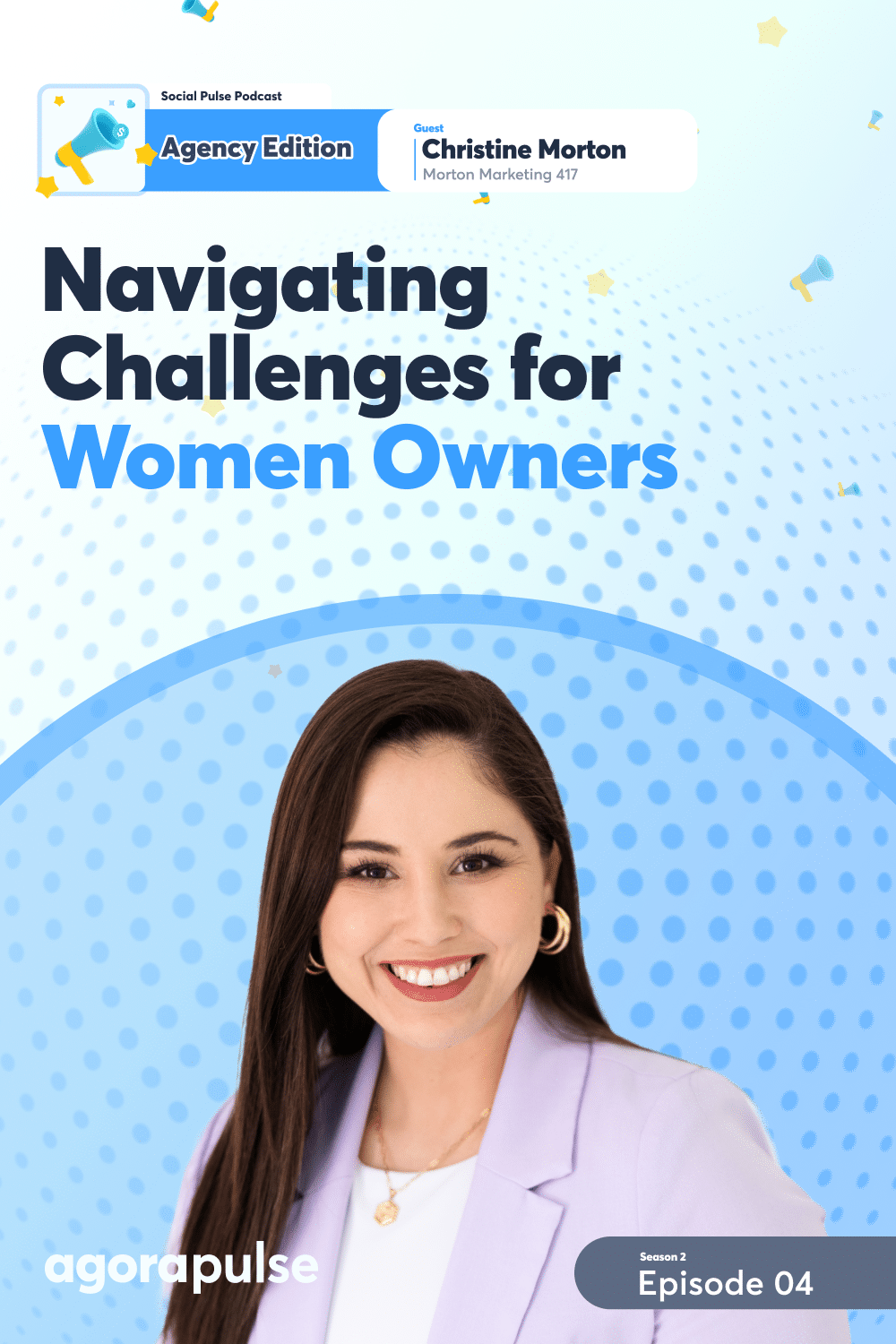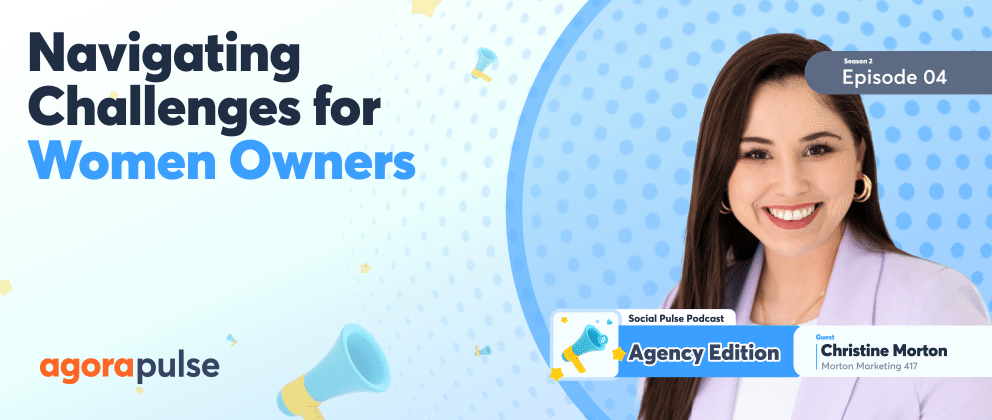Women entrepreneurs face unique challenges in leveraging their agencies’ full potential. From building authentic connections to turning engagement into profit, navigating these hurdles requires strategic planning and innovative approaches today.
Agorapulse’s Chief Storyteller Mike Allton sits down with Christine Morton, a former TV news and business journal reporter and the founder of Morton Marketing 417 LLC. Christine specializes in creating connection-driven content strategies that transform social media posts into profitable ventures with their extensive background in journalism, storytelling, and strategic content marketing, Christine has helped businesses nationwide achieve incredible success on social media.
[Listen to the full episode below, or get the highlights of the Social Pulse: Agency Edition, powered by Agorapulse. Try it for free today.]
Challenges for Women Entrepreneurs
Mike Allton: I’m really excited to hear your thoughts on this particular angle. I’d love it if you could start by just sharing some of the unique challenges that you see women entrepreneurs facing, particularly when it comes to using social media for business.
Christine Morton: Yeah, absolutely. When you were saying that the number one challenge that I hear is the fear of being seen, the fear of being judged, that if they show up on social media for their business, I’ll take a step back and say the best strategies that you can put out there for social media right now require video. And they also require you to get on video as a business owner and show your team.
As a woman entrepreneur, I have seen while coaching these women, is that fear that someone’s going to judge them. They’re going to say something. They’re going to say something that’ll get them canceled.
It’s a fear that people are going to judge them or mock them.
“It’s something that I’m always constantly coaching women, entrepreneurs, and even sometimes men that it’s okay to be seen. It’s okay to have an opinion. It’s okay to put yourself out there because, at the end of the day, your social media is not for empathy.
It’s for you and it’s to help the consumer that you’re trying to attract to your business.” (Christine Morton)
How do you think storytelling plays a role in overcoming some social media challenges?
Christine Morton: Gosh, in my opinion, the way that marketing is going and honestly, I think how marketing was always intended to be “storytelling is king”.
You want to relate to your audience. You want to build that trust, like no factor that’s needed to even have someone want to entertain the idea of buying from you. Storytelling is key.
I tell my clients all the time that storytelling content will always do the best, no matter what platform you’re on and promotional content will always do the worst, but they’re equally as important. They just have their own role, but you’re right. Getting on camera is just one tiny little smidge of storytelling. You also want to tell who you are, and how you help your growth story.
One of the things, the pushback that I get is if they tell their story, they don’t want people to think that it’s all about them, that they’re bragging, and I disagree.
I think that when you tell your story, your growth, the challenges, how you’ve overcome that, and you inspire other people, you’re going to attract like-minded individuals, and those are going to be your best customers because they value the product or service that you put out there. “Don’t be afraid” is what I always tell my clients, and we write down the caption to show them and usually when they see what we’ve written, they’re like, “Okay, that’s not bad.” And they’re like, “I feel comfortable putting that out there.” However, remembering to continuously do it versus like, “Oh, I’m just going to put out one piece of content that tells my story and then forget about it.”
We infuse storytelling in different ways. You know, storytelling content can also be a little bit entertaining where you show off the personality, the culture of your staff, right? Make sure that you are showing all of the people behind the scenes and I will say that sometimes storytelling could be as simple as showing the behind-the-scenes.
Take a bakery for example. We’ll talk about a cupcake, you have a cupcake, and just the building of the cupcake, you have the bread, you have the sprinkles, the icing, whatever it is. That’s a story within itself of showing the story of your work in action. So don’t always think that you need to be on camera to share your story. You can show your processes, behind-the-scenes moments, and things like that, that also paint a picture and tell that story.
Mike Allton: Well, that’s absolutely right. Yeah. You can include a B-roll. You can have the focus of the camera someplace other than your face. And it’s so interesting that you say, you know, first of all, you got to repeat yourself. That’s true.
One of my other shows, the B2B edition, we talked to Jay Baer, a preeminent speaker/B2B marketer. And we emphasize in that show over and over again, how important it is to have a message and share that message over and over and over again, because your social media followers, only a fraction of them are seeing each individual post. And they don’t remember what you posted a month, six months ago. Not even your mother remembers that.
Remember that, folks, but I think most importantly, that point is about just the simple fact of sharing your story.
I’ve been recently following a consultant on threads who’s about storytelling. Her name is Mackenzie.
And it’s so interesting in her posts because not only is she talking about storytelling, she’s emphasizing the fact that it needs to be first person. It needs to be “how I did this, I accomplished this. I faced this challenge and overcame it,” because that’s what’s going to allow your target audience to relate to you and that content and see you achieving success, see you overcoming whatever it is that you’re overcoming or accomplishing or baking amazing baked goods. We want to be able to see that.
I wonder if you could share an example from one of the folks that you’ve worked with, someone who’s successfully navigated some of these social media challenges and the strategies they’ve used.
Christine Morton: When I think of my clients, when we create strategies, we look at it as a holistic approach.
- Messaging is the most important part of any marketing campaign you do, whether that’s on radio, TV, billboards, whatever. The messaging is what’s going to stand out the most and truly get someone to convert. So it’s really important.
- Strategy. I’ve said to people, “What’s your strategy?” And they were like, “Well, we have a really beautiful social media feed.” And I’m like, “That’s not a strategy.”
- The strategy comes down to the messaging. What are you saying where your audience goes? My goal for my clients is that their audience goes, “Are they in my head? How did they know I was feeling that way?”
- Emotion. When you use emotion to drive in your captions, you’re going to get people to stop the scroll and listen. Now, I always put a disclaimer on this because people think, “Well, I don’t want to put emotions because we never want to manipulate anyone. We never want to put anyone down, never anything like that.” We want to always come from an empowering standpoint, but we want them to know that, “Hey, we understand how you’re feeling,” because when you can really relate to them, and I call it micro-stories in a caption where you write little lines.
Micro-stories
I’ll give you an example of a fitness gym. You never want to just say, “Oh, we can help you lose weight!”
You want to come at it from a standpoint of like, “Let me know if this sounds like you: You’re afraid to wear a sleeveless shirt in the summer because you don’t like your arms. You can’t run around with your kids at the playground. You haven’t gotten into a swimsuit in five years because you’re afraid to look at yourself in the mirror or be afraid you’ll be judged at the pool.”
Those types of micro-stories in a caption gets people to go ’cause I know it does it for me. And I know as a storyteller that when you infuse more storytelling into your marketing in general, you’re going to get a better ROI.
I see it time and time again with my own clients that the more that the business owner allows for storytelling to be a pillar of our campaigns, the more response they get from their audience. I find it, you know, to go to your point about marketing and messaging. I honestly say to my clients, “If you don’t feel like a broken record, then you’re not doing marketing, right? Because you will feel like a broken record. That is what you should be doing.”
Now, you don’t want to feel like a broken record and it’d be the wrong messaging. We want to make sure it’s the right one, but it is going to feel like, “Wow, I feel like I’ve said the same thing over and over again.” You should because not every piece of content is going to reach your whole audience, and you never know who you’re going to touch with your messaging.
It’s so important to remember that social media marketing, marketing in general, has a compound effect.
It’s something that you do consistently and strategically day in and day out so that you are top of mind when the consumer says, “Hey, I have a problem. I need a solution. I already know who to go to in the same breath.”
We’re in the digital word-of-mouth era, right? So when people look for recommendations on local Facebook groups, you want to be named. And when you are named, if they pick your business and they go on your social media page, you don’t want it to be a desert, a dead zone. You want to make sure you have content that speaks directly to them already there so that when they’re vetting you as a business, they’re like, “Yeah, I’m going to give them a call. They seem like they know what they’re talking about and they’ve helped, you know, Nancy over here. I love the prop work they’ve done here.”
You’ve literally created a digital storefront on your social media.
Don’t miss out on brand new episodes of Social Pulse: Agency Edition.
Misconceptions Women Entrepreneurs Have
I’m wondering what are some misconceptions women entrepreneurs might have when it comes to using social media effectively.
Christine Morton: I think one of the biggest ones is the misconception that social media marketing can save you.
If you start posting on social media, you’re going to be this overnight success and you’re going to make a lot of money. And that is not true. Can you make money from social media? Absolutely. But it does take time.
Social media marketing is a long game and I am excruciatingly transparent about that.
You know it takes time. And that really what you want to be doing when it comes to social media marketing is you want to use other forms of marketing so that you funnel to your social media. Our most successful clients do TV, they do radio, or they use Google Ads or Facebook Ads. Email marketing. They have multiple marketing tactics at play so that when it all funnels to social media, it’s easier for the consumer to make a decision.
When we create a strategy, we think of that whole sales funnel as a whole. We think of the buyer’s journey, making sure that they’re hitting all of those different bases that they need to go through in order to make that decision on whether they want to buy from you. And sometimes there’s that misconception because they see it. We see it all the time from marketing that is like, “I posted three days and now I’ve made a million dollars.” And I’m like, “I posted almost every day and that’s not me. Why is that on me?” We see it all the time and people get bought into that story. And it’s a sales tactic. It’s a marketing tactic that people are using.
Unfortunately, it makes me sad that some people fall for it. Now, does that mean that it doesn’t happen? Absolutely. Some people get lucky and it does happen. However, I think that one of my goals as a social media marketing agency is to be very transparent with my clients. It’s a huge value we have here at Marketing 417 that social media or marketing you do in general, it’s a long game. Also, I think the next one to follow that one up is everybody thinks my job as a social media strategist, and social media manager is easy, and it is not. There is always that misconception I hear all the time, like, “Oh, you just like to post pretty pictures and I see those videos.”
And I’m like, “Gosh, if you saw how long it took me to edit that video or how many times I wanted to chuck my phone out the window because there were glitches on Instagram like I give you a week doing my job.” And then you’d be like, “You know what, I’ll pay you a million dollars. Just do it.”
I truly believe that social media marketing managers and social media strategists don’t get the credit that is due yet. I think we’re getting there. I think the industry is still so new that I honestly can’t wait to see it evolve because truly social media marketing is going to become a necessary component of marketing plans for companies nationwide.
Getting Started As Women Entrepreneurs
Mike Allton: One of the underlying themes I’m hearing from you is the need for authenticity and the need for connection and relationship building, right? Where you’re creating content that the audience can relate to and connect with.
How do you start to build a strategy that has that connection-driven content first in mind?
Christine Morton: That’s a great question. So we actually have a method to our madness, is what I say. I actually call it Christine’s Connection Method. And we have to get clear on two things.
- Before we even touch any market research, we even build out a content strategy and content calendar. We have to get clear on who the business is. ‘Cause I feel like that’s number one because so many people forget to look at who I am and how I contributed to where I am now because that’s huge.
- Consumers want to connect with you. They want to know who you are, and who they are buying from. I say this all the time. If you haven’t noticed, we don’t have door-to-door salesmen anymore.
It does. It’s not as common as it was back in the day because people can go straight to Google. They can go straight to social media to see who you are and look for a recommendation, whatever they need. - So that’s why it’s so important to have that social media presence that says who you are. I don’t know if you feel this way, Mike, but let me know when I buy from businesses today and then maybe it’s just me.
- I will say, I know a few friends who do this, but I like to look up companies that I buy from. I like to know who is the CEO. What are their values? Does it align with mine? I feel like a lot of people are doing that today.
- I know that I do it because I like to support specific businesses as well as a woman.
So it’s really important for me. Do you find yourself doing that at all, Mike?
Mike Allton: Absolutely. And I, and I hear that too, from the people that either I’m working with personally or people that we’re working with through Agorapulse, they’re looking at our leadership. They’re looking at our values. They’re looking at how are we supporting women and minorities and that sort of thing. It’s something that comes up a lot with our events, right? Where I’m picking a lot of speakers and that sort of thing. And they want to see that it’s not a crowd of 30, middle-aged white dudes like me, there’s some variety and some diversity in there. I think those are important values.
Christine Morton: Absolutely. And I know that it is for myself and I have a few friends that are that way. So knowing when we create that content strategy before we do it, we map out who they are as a business. What are your values? What’s your mission? What’s your positioning statement?
I can’t tell you how many times I ask a business, “Okay, what do you sell?” And they always know the tangible thing. But they don’t know the emotional side and like, okay, so we can’t effectively sell right now because you don’t know what you truly sell.
I’ll give you an example. So I spoke with an embroidery company that did t-shirts, sweatshirts, things like that. They were like, “Yeah, we sell t-shirts, you know, all that.” I’m like, “Okay. On your marketing, that’s not what you sell.” So if I said to you, Mike, what do they sell? What do you think they actually sell from an emotional standpoint? What do you think you would say?
Mike Allton: My first thought goes back to some of the embroidery stores that I would have worked with when I was in high school and they were selling team spirit.
Christine Morton: Nailed it. Memories. Memories. That’s what you’re selling.
People are buying t-shirts today for team spirit and for bachelorette parties, weddings, whatever it is. You are selling memories that every time they put on that T-shirt. They’re like, “Oh, do you remember that time with Sally when we hung out at the beach till four in the morning? We watched the sunrise.”
That’s what’s going through their mind. Not “I bought a T-shirt and it’s teal and it was on the discount rack.”
So you want to use that in your marketing and the best way to know that is to map out the community. So that’s number two. So we figure out who you are.
Step two: Get clear on the community. How do they respond in a sense of consumer behavior? What are they looking for? And what are their emotions? What drives them to make a purchase, and why are they utilizing your business to begin with? And then we need to use that to create your unique selling proposition to then be able to create effective content strategies.
Tools and Platforms for Women Entrepreneurs
Are there any particular tools or platforms that you recommend in particular for women entrepreneurs to help them maximize their social media presence?
Christine Morton: Great question. So obviously when it comes to the platform, we want to make sure that whatever platform you decide to do in a sense, social media platform aligns with your goals and it aligns with the audience they’re trying to attract. So I can’t definitely tell you where to go.
I will say my favorite is Instagram because I am a video person. So I love the video features, except I do appreciate that TikTok has fewer glitches than Instagram when it comes to video. But I personally love CapCut for video. So we use that a lot here at my agency to create videos and reels for our clients, because, to me, it has everything at your fingertips that I could have done as a TV journalist when I had music. But the free version is just as fantastic as the paid. And if you want to do paid, I think it’s like $9 a month. It’s fantastic. So we use that a lot because, for anyone who is not familiar with video, there are tons of YouTube videos to help you get acclimated with CapCut. So we use that a lot and I highly recommend it, and there are also a lot fewer glitches than Instagram.
Advice to Women Entrepreneurs
So for women-owned businesses, what advice do you have for them? How can they turn social media engagement into profitable outcomes?
Christine Morton: Yeah. Great question. And what I’m seeing right now, a trend where you can make money from social media is using your business and turning it into a personal brand. And that comes down to storytelling. So not being afraid to get on video, sharing stories, get on camera, looking them straight in the eye using “I”, and then using “you” so that your audience feels like you’re just speaking directly to them one person at a time.
If you create that personal brand and allow people basically a window into your soul. That’s what I always say. You’re going to be able to build that trust, like no factor way faster than if you’re just talking about your products or just talking about your services.
I always tell women entrepreneurs that you are going to make more money on social media. If you prioritize the two reasons why social media was invented in the first place, that’s networking and entertainment. The moment that you forget that in your strategy, the moment that your audience goes bye and they just keep scrolling.
I tell people all the time, we have an attention span that’s less than a goldfish. And that was a study done in 2015, so it’s probably worse now. So we need to make sure that we are creating content that’s engaging and storytelling really does that. So the more that you put yourself out there, fight through those fears, which isn’t easy.
Measuring Success
How do we know what’s working? How do you measure the success of all this social media effort? And how do you track that and bring it back and reinform your future strategies?
Christine Morton: Yeah, great question. So there’s obviously a few ways, obviously, you can track the analytics. You can look at your dashboard on Instagram. You can invest in a tool to help you do that. Absolutely. Now, as a social media strategist, and I say this with my team as well, we do not live and die by the analytics. And the reason is that marketing fluctuates the algorithm, I’m sorry, but Instagram changes its mind every five minutes. It’s just a matter of fact. So I tell my clients that we look at the engagement. We want to make sure that the engagement number looks pretty good. People are responding to the content because that says a lot.
I also remind my clients that there’s this new type of consumer, and it’s called the silent lurker: They don’t actually engage, but they are watching and they are hardcore watching.
- I’ll give you an example: I was working with a client. And they had someone come into their place of business and their gym, and they wanted to just try out the workout and they tried it out. They did it. And they’re like, “Okay.”
- And then they left and they came back a month or two later. I can’t really remember. And were like, “You know, I’ve been following you guys. I’ve been watching you guys on Facebook. You know what? I think I’m going to sign up.”
- And then he was part of a big business. And he was like, “Actually, I think I’m going to sign and do a corporate deal with you guys as well.” Did not engage with our content at all.
- So it showed the importance of being consistent because there is that consumer today, that’s the silent lurker.
- And to be really honest with you, I think we have created that consumer because so many people are so tired of being sold to, and they’re afraid that if they interact, you’re going to be in their DMs. You’re going to be reaching out to them, and they don’t want that. That’s why they become the silent lurker.
- So with that in mind, I always tell my clients to also be on the lookout.
- What are people saying to you? Are people coming into your place of business and saying they saw your videos? You know, are you getting referred on social media? All of that matters just as much as the followers, right?
At the end of the day, you can have 20,000 followers. I’ve seen this where people have like 20,000, so many followers. But they’re not making any money from it because they don’t know how to actually utilize the followers that they have.
So if you can’t speak to a hundred and make money, you’re not going to be able to do it at 20,000.
I’m always stressing that analytics are important. Yes. we want to look at them. They do give us some sense of what’s going on, but also talking to the consumer, asking them where they found you is also really important because of that silent lurker consumer that is really starting to become more and more prevalent today.
Final Advice
To women entrepreneurs who may be just starting out with their social media, I’d love if you could just share any bottom-line advice for them.
Christine Morton: Yeah, absolutely. So when, if you’re just starting out on your journey on social media, I would be prioritizing three types of content.
- We want to map out who we’re trying to attract, but if you’re going to put content out there, we want it to be storytelling for all the reasons we’ve talked about today.
- The second is educational. This allows your audience to really see the value of what you offer and it really helps build that credibility.
- Inspirational is another type of content, because it also reinforces the credibility that you’ve established through educational content so that you are really moving through that like no trust factor that they need to build any type of relationship with you, you know, and at the same time, I would love to let new business owners know that we were jumping on the social media train. You know, I applaud you that you’re making an effort to do that.
- I want you to give yourself some grace because social media marketing is time-consuming and it’s hard. And I don’t want you to think that if you’re watching all these social media gurus you have to post exactly at 6 a.m. with the sun tilted a certain way in a corner, like, no, get a post out there, right? If you can’t really invest in a full strategy right now, there are not a lot of resources. Putting something out there is better than nothing at all. And trying and you know, I applaud you because it is really difficult.
Just know that showing up, doing your best, putting some content out there, and trying to get on video, understand that when you start on video, you’re not going to be great. Nobody is. Nobody is great.
Give yourself some grace, and remember to have some fun because the more fun that you have on social media, that energy is going to be so contagious to your audience, and they’re going to be able to build their relationship with you faster. If they truly know that you’re passionate about what you do and how you can help them.
Thank you for reading about how agencies can create passive income in this latest episode of Social Pulse Podcast: Agency Edition on Apple, powered by Agorapulse, where each and every week we’re talking to marketing agencies like you going through many of the same struggles you’re going through and sharing their stories, subscribe to find in each episode, inspiration, motivation, and the perspiration that go into growing and scaling agencies like yours. Then leave us a review. We’d love to know what you think.
Until next time!






